People say the past is a foreign country (well, L. P. Hartley wrote it in 1953 and we’ve sort of just been repeating it when it suits ever since), which is a sentiment that, as it turns out, is a lot more complicated than I initially thought when I decided it would make a good framing device for this post. I’ve got it stuck in my head now, though, and I can’t think of another way to start this, so I’m just going to run with it. It’s an appealing statement, one that seems to, in six words, encapsulate the gulf that can appear when we look back on past ages and aeons and the people, societies and cultures that inhabited them. However many questions I have about the analogy (and it’s a lot, apparently), I have to admit that it’s also one that seems startlingly apt, sometimes, when I’m researching people and places from long ago. There’s a great deal of familiarity in the past, in the way that people interact with each other, in their motivations and behaviour, in the way they use objects and construct their physical surroundings. But there’s also quite a lot of unfamiliarity, a dissonance between then and now that is apparent in many ways, but perhaps, for me, never quite so much as when I come across terminology and phrasing from the Victorian era that is either completely indecipherable in meaning or somehow close enough to modern English to be even more obviously from a different time (or country).
I’ve already written about language and archaeology on here, in relation to the languages of analysis and recording around the world, and how speaking the same language is not always a guarantee that words have the same meaning. This post takes the same principle, but shifts focus a little to the language of the 19th century, not as a linguist (which I’m not!) but as a researcher who finds that the English of the Victorians sometimes requires a bit of thinking outside the box to translate to the modern day. So, the following is a handful of terms and phrases that a) confused me greatly when I read them and b) turned out to have interesting (if not always good) stories behind their meaning.
“Dead-eye dick literature”
The story behind this phrase involves one of my favourite anecdotes from Victorian Christchurch. I came across it while researching a man named Thomas Pillow, the proprietor of one of the shops I have artefacts from and a man who had the misfortune to be remembered, at least in part, through this misdeeds of his son, Albert. In 1879, at the tender age of 18, Albert decided to a) steal a bunch of antique weaponry from Canterbury Museum and b) hold up a carriage in Riccarton, wearing a black mask with cut-out eyeholes, two pairs of trousers and two coats, armed with a revolver and an antique Japanese dagger, one of the spoils from his trip to the museum.
It did not go to plan.
The people being held up did not take kindly to it, there was a bit of a scuffle and Albert was arrested and charged with assault and, after the police had searched his bedroom at his dad’s house and found the imitation poignard, and two spear heads from the museum, larceny. Headlines at the time had fun telling the story of “Pillow, the Christchurch Highwayman” and the story lived on long enough to be included in George Ranald Macdonald’s Dictionary of Canterbury Biography entry for the Pillow family. In it, Macdonald has this to say about Albert’s actions and motivations: “A youth of 18 after doing a course of Dead-Eye Dick literature stole 2 daggers from the museum and armed himself with a revolver and ammunition. Putting on 2 suits to increase his size, he held up a carriage in Riccarton. He couldn’t quite carry it off and was charged with assault.”
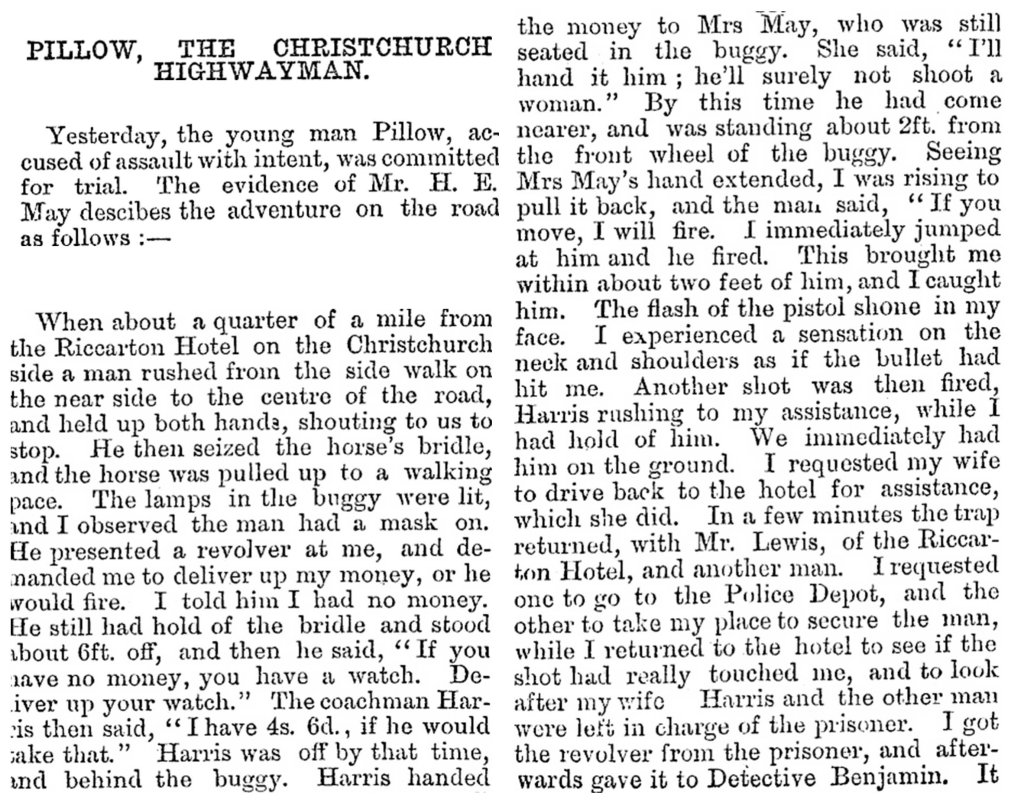
It turns out that “Dead-eye Dick literature” refers to the dime novels of the late nineteenth and early twentieth-century, stories of adventure and daring – often in the American west – that featured characters like “Deadwood Dick”(possibly based on a real cowboy, Nat Love?) and “Dick Deadeye”, among many others. The term ‘dead-eye” seems to be synonymous with marksmanship and straight shooting, although it might also have something to do with sailors but, by the 1930s, “Dead-eye Dick literature” appears to have become a proxy for all dime novels, as this 1937 headline in the New York Times magazine suggests.
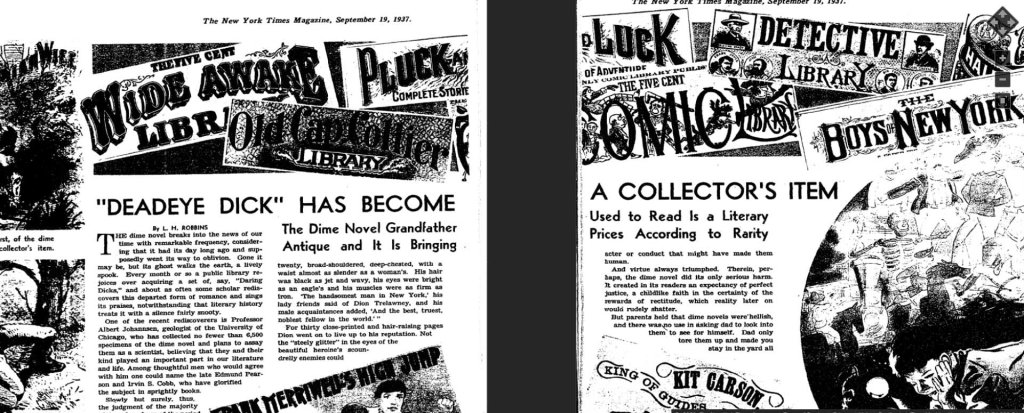
The emergence of dime novels seems to be attributed to Irwin P. Beadle and company in 1860s America (well in time for Albert Pillow to have grown up with them) and they were very popular by the 1870s, when they’re first mentioned in New Zealand newspapers. As the decades progress, they quickly become associated with bad behaviour – not just of children! – in newspaper accounts, a kind of anti-moralistic devil-on-the-shoulder kind of influence (not far from the modern day “kids and their videogames!” I reckon). All of which might come to explain why George Macdonald uses the term to explain Albert Pillow’s somewhat ill-fated actions in 1879 (although it’s worth noting that I couldn’t find a reference to dime novels in the 1879 accounts of the incident).
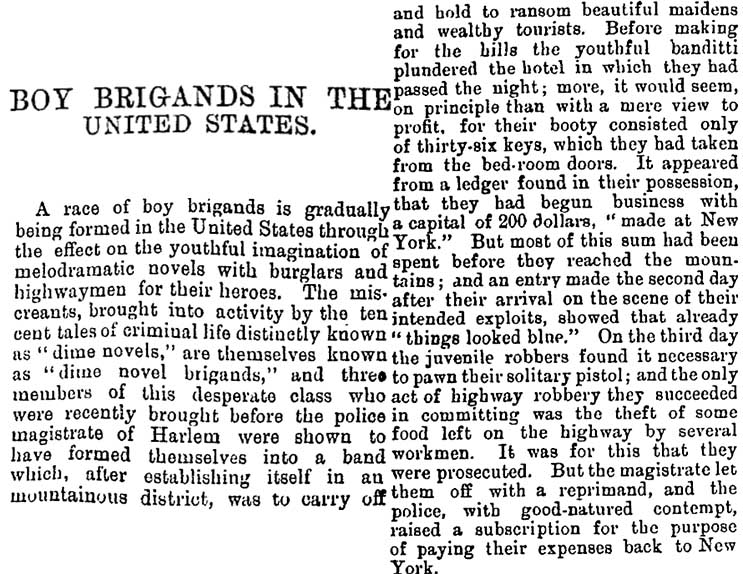
This whole story, and the terminology used in the different accounts of it, is a great example of how much the information in a historical record can be influenced by the time period in which it was written, as well as the person who wrote it. And how much language changes over decades. Macdonald was writing in the mid-twentieth century, about an incident that occurred in 1879, both of which I’m reading about from 2020. It seems likely that the phrase “dead-eye dick literature” would have been as unfamiliar to Albert as it is to me – it doesn’t appear in New Zealand newspapers until the 1900s, despite frequent mention of dime novels themselves in earlier decades, and a lot of the international examples I could find of the term were early to mid-twentieth century in nature, like these “Dead-Eye Western Comics” from 1948. In a way, its use tells me as much about mid-twentieth century New Zealand as it does about Victorian Christchurch, as well as mid-twentieth century attitudes towards objects and events of the nineteenth century.
“Knights of the burnt cork”
In an era that happily named meetings of like-minded people things like the “Royal Antediluvian Order of Buffaloes”, this seems like it could mean anything. But no, it’s a reference to blackface (surprise, racism!).
Blackface is a topic too huge and too complicated to really discuss in a short section of a single blog post (and one that has been written about in detail elsewhere), but suffice to say that minstrelsy, including blackface minstrelsy, was a part of the live entertainment available to New Zealanders during the course of European colonial settlement, from the nineteenth century onwards (unfortunately, it still crops up sometimes, even in 2020). I came across this particular term for it in an account of a ‘juvenile’ minstrel show performed by children at a school in Christchurch in 1879, and it can be found in other advertisements for blackface minstrel shows throughout the nineteenth and twentieth centuries.

The term itself comes from the use of burnt cork – often mixed with water or petroleum jelly – to darken the skin of the white actors performing in blackface (Mahar 1999). The title of ‘knights of the burnt cork’ serves to imply a gallantry and nobility that is completely at odds with the nature of blackface as a tool that demeans, caricatures and denigrates, but it also – at least to me – evokes the terminology of the Ku Klux Klan, whose members were also called ‘knights’. It seems like peak Victorian whimsy on first reading, but, like so much of that era, the whimsy is just a cover for the deeply terrible attitudes and racism that went hand in hand with European colonialism around the world.
“Gone over to the great majority”
Monty Python should have used this one in the parrot sketch. Yep, it’s yet another way of saying that someone has died. One that both implies a sort of crossing of the picket line between life and death and recognises that the living are greatly outnumbered by the dead.
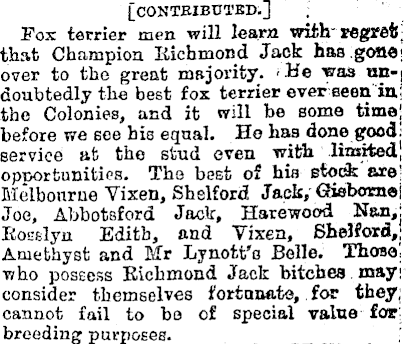
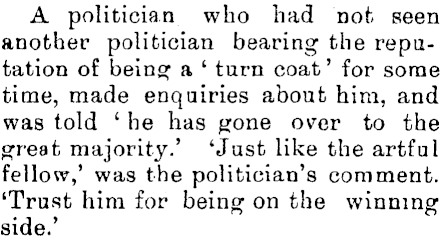
“Good wine needs no bush”
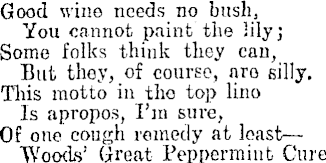
I really didn’t understand this one when I read it. I came across it in an advertisement for Woods’ Great Peppermint Cure, which is ironic, as the phrase appears to mean that a good quality item or product requires no advertising (similar sentiment to gilding the lily, I think). It seems to be derived from two things – the use of a branch or bunch of ivy, hung outside a tavern, to advertise the presence of wine within and a very old tradition of adding a ‘bush’ of rosemary to drink to improve the flavour. Like so many English idioms, it’s also Shakespearian, found in the epilogue to As You Like It.
In nineteenth century New Zealand, it seems to have been co-opted by everyone from politicians, advertisers and entertainers to those who also seemed to be confused by it, including a contractor who managed to baffle the Lyttelton Times by stating that “good wine needs no bush, but a good bridge needs a great deal”.

“Funambulist” and “Equilibrist”
I love both of these terms, because you can see the relationship of the word (especially the compound ‘funambulist’) to their meaning. They both refer to tightrope walkers: funambulist – rope + walker (sadly, not fun + walker, as I first thought); and equilibrist – basically, ‘balancer’. I’m not entirely sure what the difference is between the two terms, although I’ve found at least one example of an equilibrist act involving bicycles, and I get the sense it might have been more generally used to refer to those whose acts involved feats of balancing.
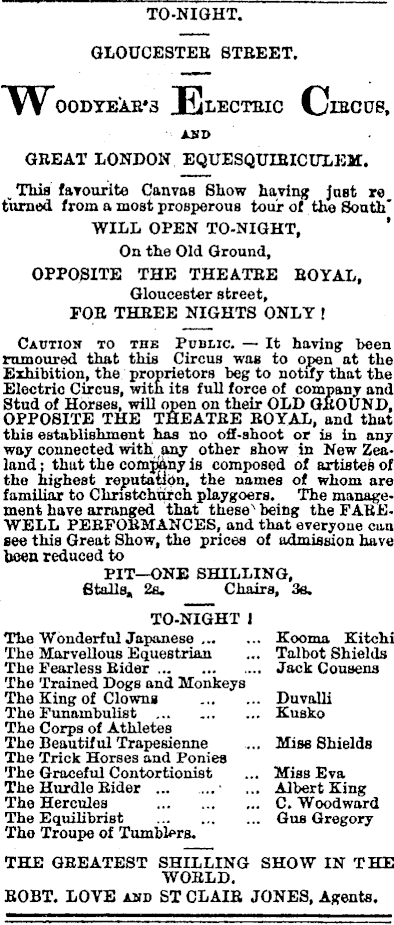
Both terms appear in several of the advertisements for the circuses that used to set up shop on what is now the site of the Isaac Theatre Royal, from which a fairly large assemblage of artefacts was excavated between 2012 and 2014 (Webb et al. 2016). The section was vacant during the nineteenth century and, as well as functioning as a space for people to throw their litter, it was the temporary home of a number of different circuses and travelling performances during the latter decades of the nineteenth century, including those who travelled with equilibrists and funambulists (and, just in case you thought this was a light-hearted fun story, also featured a variety of acts that were racist in execution and/or in advertising, including minstrel troupes likely to have included blackface).
“Finest white snowdrops”
This, you’d think, is fairly self-explanatory, but no. It doesn’t refer to flowers, but to sugar. “Finest white snowdrops in pockets”, as advertised frequently during the 1870s in Christchurch.
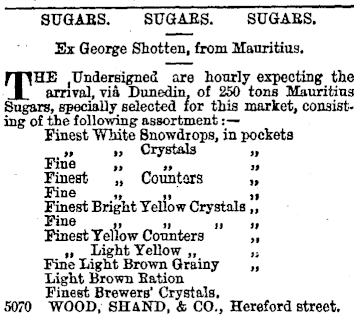
You might be amused to know that I found myself wondering if the term was ever co-opted in the twentieth century for cocaine and so googled “finest white snowdrops cocaine” and, rather than finding anything about the history of drug terminology, found this story about Walmart selling a “Santa snorting cocaine” Christmas jersey. Never underestimate the ability of the internet to surprise you.
Enjoy the long weekend everybody!
Jessie

